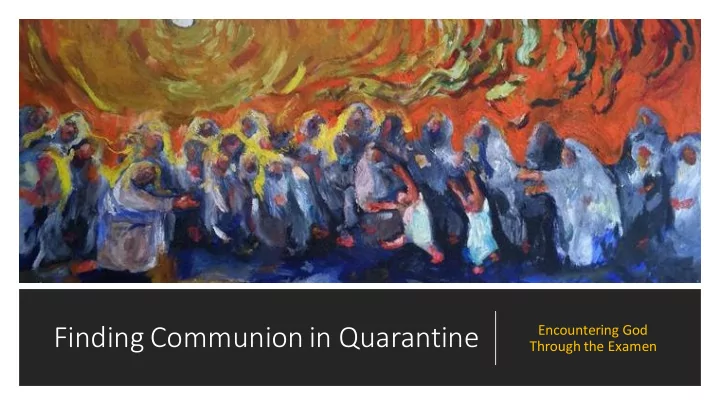

Finding Communion in Quarantine Encountering God Through the Examen
Objectives • Find the courage to name our reality • Consider how the Ignatian Examen can be a resource during these days • Put this spiritual exercise into practice
First Question • First question God asks Adam and Eve not “What were you thinking?” or “Do you know what you just did?” • Not about what they did but is more tender: “Where are you” (Genesis 3:9) • This is the first question of the spiritual pilgrimage.
Answers Vary Where am I? • Socially distanced/Quarantined • Homesick • Anxious • Resentful • Fearful • Sad • Shattered or Fractured
Where am I? Everything seems unreal. Everything I used to know, to count and depend on, has been pulled away. Everything that gave order and meaning to my life is gone. Sometimes, when I pray, I am bitter that the God who should protect us, should preserve us, has abandoned us. But…as everything breaks down, a sense of breakthrough. Maybe…just maybe…it was the life I was living before that was unreal. It’s just so “Unreal”
The Examen: Looking Backward to Move Forward We take an honest look at where we are, at how we are, and allow God to speak to our hearts. Over time, we may notice patterns that guide us toward deeper harmony with God’s loving will for us. Not a formula or equation but a spiritual practice or exercise. The more we do it, the better it goes! True prayer means praying who we are , of beginning where we are at and allowing the Spirit to guide us.
A Spiritual Exercise Five Steps 1. Ask God’s Spirit for light to see where you are now. Ask God for gift of gratitude. Review day, or week, attentive to graces you experienced. 2. Allow God to guide you as you review your day/week. What feelings do you notice? 3. Notice where you felt God’s closeness & distance, your triumphs & failures. 4. Choose one feeling and pray with it. This feeling is an opening in your heart. Speak to God through it. 5. Look to tomorrow. How are you being called to put this prayer into practice? How will you become a living prayer?
Easing In: “Primary Wonder” ~Denise Levertov
Let’s Practice • Where are you? Ask God for the light to see those things you are grateful for – big or small – and savor this gratitude. • Look back on the last day, week, or period of social distancing. Do not be afraid. What do you notice? What feelings are being stirred up? • Take a hard look at these feelings. Do you notice times when you felt close to God? Distant? Times when you felt unified and whole? Times when you felt fractured and broken? • Choose one of these and stay with it. Speak to God with it. There is no more authentic prayer than the one that arises from your innermost depths. • How will you put this prayer into concrete practice? How can you become what you have done: a living prayer?
An Easter People • We are an Easter People. We do not deny the cross. We deny that the horizon of death defines our life. • “Can’t be a friend of Jesus and an enemy of the cross.” • Prayer leads us to deeper communion (1) with God and (2) draws us into communion with all disciples.
Our Ignatian Pilgrimage A pilgrimage is a journey undertaken in the light of a story. A great event has happened; the pilgrim hears the reports and goes in search of the evidence, aspiring to be an eyewitness. The pilgrim seeks not only to confirm the experience of others firsthand but to be changed by the experience. Pilgrims often make the journey in company, but each must be changed individually; they must see for themselves, each with his or her own eyes. And as they return to ordinary life the pilgrims must tell others what they saw, recasting the story in their own terms. ~Paul Elie, The Life you Save May Be Your Own
Question and Answers Please submit any questions you’d like to raise! Email: Ryan Duns, SJ ryan.duns@Marquette.edu
Recommend
More recommend